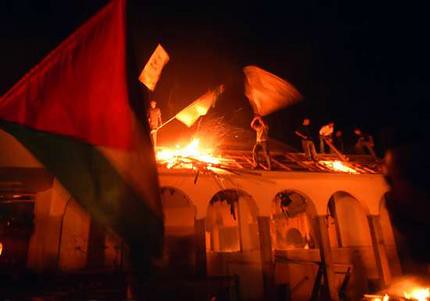Jonathan S. Tobin: Why Israelis have never forgotten their 9/11
On the 18th anniversary of the Sept. 11, 2001 attacks, government officials and institutions throughout America commemorated the horror of that day. But after all these years, there is a sense that – other than for those who lost family members or close friends – the ceremonies are increasingly becoming more a matter of going through the motions than of national grief.Brooke Goldstein: Sanders, Warren, O’Rourke among Dems showing hostility to Israel
Much like the way the memory of the Japanese attack on Pearl Harbor on Dec. 7, 1941 – a comparable tragedy that altered the life of the nation – because routine and then ultimately a footnote as the decades passed, 9/11 is becoming a moment frozen in the past and not a reminder of the dangerous world in which we still live.
That this is true is probably as much a product of human nature as it is of the failure of our leaders in the post-9/11 world. But it’s worth pointing out that this same process hasn’t been repeated in Israel as time has passed since the end of the Second Intifada that brought similar widespread horror to its victims. As a prescient op-ed published in The New York Times by Matti Friedman noted, the memory of the slaughter hangs over Israeli society and is still a decisive factor in its politics.
There are profound differences between 9/11 and the intifada. September 11, 2001 was one day that thankfully was never repeated again on American soil (a point that seemed to earn President George W. Bush no credit with the public even though most of us assumed that it would be). By contrast, what happened to Israelis was several years of a terrorist war of attrition involving hundreds of attacks, including suicide bombings that struck throughout the country rather than being concentrated in just a couple of places.
Throughout history, rising anti-Semitism has always been accompanied by other forms of radicalization and the degradation of democracy overall.
Will Democrats continue to creep closer to radical anti-Israel and even anti-Semitic policy positions? Will they undermine the party’s traditional values of tolerance and equality? If so, they risk consigning themselves to the tragic fate of Jeremy Corbyn’s British Labour Party, which has allowed a culture of anti-Semitism to take root and poison the entire institution.
In an all-too-familiar routine, far too many Democrats pander to the Jewish community on pro-Israel issues when running for office and then turn around and show their true colors after Election Day.
To date, the candidates running for president have skated by – banking on the fact that no one is asking them about a subject they’d rather ignore.
It’s time for the media to ask these questions and get real answers. Voters like me will be watching closely.
We grew up from childhood hating, cursing Jews
We were taught in the Arab world that the Holocaust was just a big lie. It was only when we grew up and opened ourselves to the world of ideas and humanity that we discovered Jews are in fact human beings, and good people, too.
Ladies and gentlemen, my name is Ensaf Haidar. I am the wife of Raif Badawi, a prisoner of conscience who is now serving his seventh year behind dark, cold prison walls in Saudi Arabia.
Two days after the horrific Charlie Hebdo massacre, my husband was dragged from his jail cell in Jeddah, brought to a square in front of Al-Jafali Mosque, and administered the first phase – 50 lashes – of a public flogging.
His crime? His indictment says he was guilty of “insulting Islam” and “producing what would disturb public order, religious values and morals.”
His real crime, in fact, can be summarized in one sentence: He believed in his fundamental right to express his opinion.
Freedom of expression is at the heart of Raif’s case.
Also central to his case is Raif’s vision of a different future for his country and region; a future based on our shared humanity; one based on acceptance, respect and mutual understanding; one that aspires for peace in the region.







































